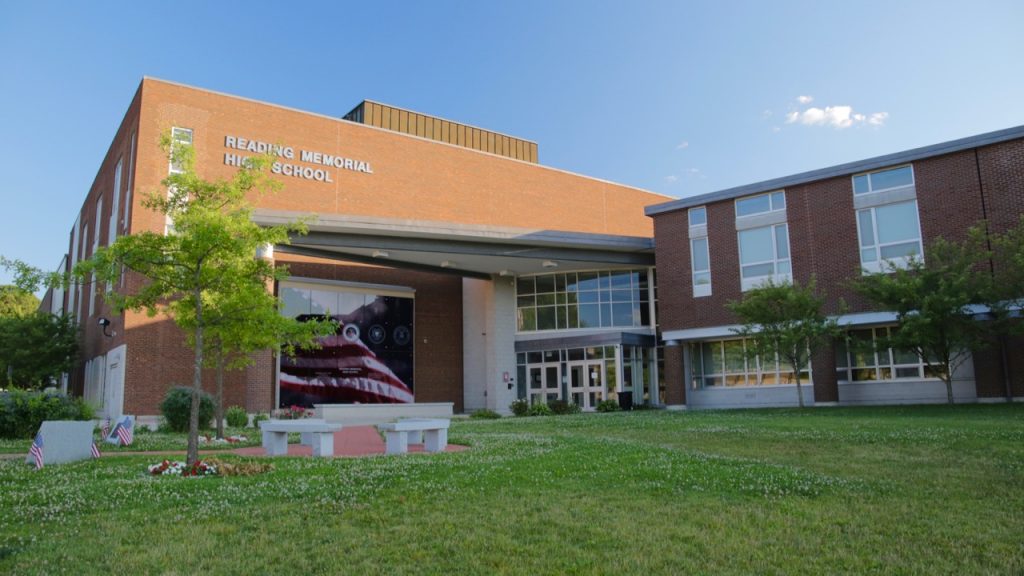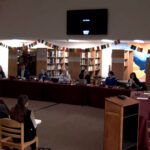Reading, MA — Superintendent John Doherty updated the School Committee on plans to return elementary students in the Reading Public Schools to full, in-person learning, on April 5, with middle and high school students to follow on April 26. Doherty presented this information as he reflected that this would be the third “reopening” that the schools have planned for this year.

Doherty explained that to allow full in-person reopening as safely as possible, mitigation factors such as facial coverings, hand-washing, and pool testing will continue. The district plans to revise its distancing policies in classrooms from six feet to three feet as evidence has shown no more significant risk factor for virus transmission in schools with the smaller distances. Doherty also reported that eighty-nine percent of school staff are at some stage of the vaccination process.
Schools will face challenges such as relocation of furniture, a change in lunch room arrangements, and scheduling changes to make full in-person learning a reality. “Our principals are hard at work to make this happen,” Doherty commented. Chief Financial Officer Gail Dowd also pointed out that the district will need to hire additional lunchroom help to manage the change and continue with the food distribution program, which will continue through the summer.
In what she referred to as a “really meaningful and profound experience for a school and a district,” Reading Memorial High School (RMHS) principal Kate Boynton presented the finalized “Portrait of the Graduate” proposal to the School Committee for its approval. The final product breaks down into three primary areas: the head, the heart, and the hand. “It represents a commitment to the local community, to the global community, [to] continual wellness, to personal responsibility, [and] to lifelong curiosity and learning,” Boynton added.
School Committee member Shawn Brandt appreciated the work stating, “It is important for us to have a common ‘North Star.’” The committee voted 6-0 to approve the work. The “Portrait of the Graduate” will be used as part of the RMHS decennial accreditation visit this upcoming April.
School Committee members Shawn Brandt and John Parks introduced a resolution condemning harassment and intimidation of Reading Public Schools administrators, teachers, and staff. This discussion was added to the agenda on Wednesday as an item “that the chair could not reasonably anticipate” in reaction to an anonymous email sent to RMHS principal Kate Boynton.
According to Brandt, the email was “vile,” sent from an encrypted website, laced with profanity, and celebrating [Boynton’s] leaving the district. Brandt further shared that the email was signed “You know who.” He and Parks presented the resolution as a means for the committee to support the administration and staff.
“This goes beyond criticism and reflects depravity,” Brandt commented.
School Committee member Carla Nazzaro expressed concern that the committee was addressing an anonymous email which, in her opinion, is a deviation from established policy. She also stated concern that the email’s text was included in the original version of the published School Committee packet. “The [email] was so disgusting; it should have been dealt with [operationally], then ignored.” Nazzaro opined. Doherty commented that police were informed of the email once he became aware of it and that IT staff had worked to determine its origin.
Later versions of the packet omitted the text of the email.
Committee member John Parks, who was the first member made aware of the email, sided with Brandt, “I felt that this is egregious enough to merit a response from the committee. It is exactly what we should be doing.” Parks argued. School Committee member Erin Gaffen agreed, “This resolution comes from an escalating pattern of people hiding behind anonymous websites, emails, and social media accounts.” Gaffen continued, “We are not writing back to the sender or telling [Doherty] how to handle this. It is a larger issue for us to take a stand on.”
“I fundamentally disagree that this should be kept private,” Brandt added. Brandt also shared that the email was only shared with the committee and placed in the original packet after having obtained Boynton’s consent. He used the example of the rash of swastikas found in and around the schools a few years ago and the committee’s reaction to those incidents as to why he thought this matter should be pursued. Nazzaro argued that the difference between the events was that the swastikas were already in public places.
Member Thomas Wise, who shared that the email had “consumed” his thoughts all day, questioned the wisdom of providing a public meeting platform to discuss the issue. “I’m not sure shining the light [on the email] is the way to deal with this.” He also wondered if addressing it publicly would embolden the sender. He did, however, recognize that “once the cat is out of the bag,” that there was no going back. Gaffen responded, “We’ve heard from groups that are more likely to be harassed . . . that [the behavior] needs to be called out.”
“We’ve set a dangerous precedent.” Nazzaro countered.
As per chair Chuck Robinson’s decision, he wanted to follow the open meeting law. Given the late notice to the public of the discussion, the resolution will be voted on at the April 1 School Committee meeting.
The committee also engaged in the second reading of policy IMB, the teaching of controversial subjects. While the new wording of the policy was developed by a working group that included Nazzaro, she believed that the new policy is no longer an IMB policy and should be deferred until after July 1. The working group was initially created after she had expressed concern that students with conservative voices do not feel comfortable sharing their viewpoint in Reading schools.
Brandt, another member of the working group, proposed that the revised policy accomplishes two goals: the first being to affirm teachers’ and schools’ role to engage in complex topics and provide clear boundaries about how to conduct those discussions. “The changes [to the policy] move the policy forward in these ways,” Brandt stated.
Wise countered with his belief that the policy is now too broad for its original intent and that if the committee is going to vote the new policy, it should do so one piece at a time as individual amendments. He then moved to table the discussion to allow for this to occur. The committee voted 5-1 to table the discussion to the April 1 School Committee meeting.
The School Committee adjourned at 10:45pm.

